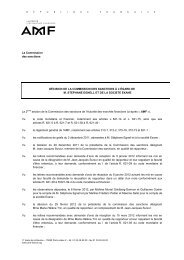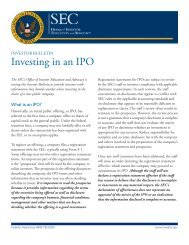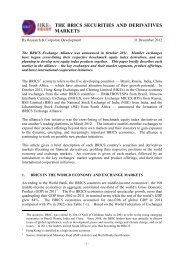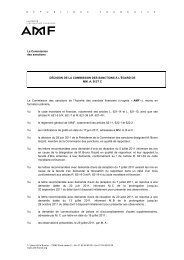Climate change, impacts and vulnerability in Europe ... - MemoFin.fr
Climate change, impacts and vulnerability in Europe ... - MemoFin.fr
Climate change, impacts and vulnerability in Europe ... - MemoFin.fr
You also want an ePaper? Increase the reach of your titles
YUMPU automatically turns print PDFs into web optimized ePapers that Google loves.
Technical summaryMounta<strong>in</strong> areasThe <strong>in</strong>crease <strong>in</strong> temperature is particularly high<strong>in</strong> many mounta<strong>in</strong> regions, where loss of glaciermass, reduced snow cover, thaw<strong>in</strong>g of perma<strong>fr</strong>ost<strong>and</strong> chang<strong>in</strong>g precipitation patterns, <strong>in</strong>clud<strong>in</strong>g lessprecipitation fall<strong>in</strong>g as snow, have been observed<strong>and</strong> are expected to <strong>in</strong>crease further. This couldlead to an <strong>in</strong>crease <strong>in</strong> the <strong>fr</strong>equency <strong>and</strong> <strong>in</strong>tensityof floods <strong>in</strong> some mounta<strong>in</strong> areas (e.g. <strong>in</strong> parts ofSc<strong>and</strong><strong>in</strong>avia) that can impact people <strong>and</strong> the builtenvironment. Additional projected <strong>impacts</strong> <strong>in</strong>cludereduced w<strong>in</strong>ter tourism, lower energy potential<strong>fr</strong>om hydropower <strong>in</strong> southern <strong>Europe</strong>, a shift <strong>in</strong>vegetation zones <strong>and</strong> extensive biodiversity loss.Plant <strong>and</strong> animal species liv<strong>in</strong>g close to mounta<strong>in</strong>tops face the risk of becom<strong>in</strong>g ext<strong>in</strong>ct due to the<strong>in</strong>ability to migrate to higher regions.The retreat of the vast majority of glaciers alsoaffects water availability <strong>in</strong> downstream areas.Damage costsDamage costs <strong>fr</strong>om weather <strong>and</strong> climate-relateddisastersHydro-meteorological events (storms, floods, <strong>and</strong>l<strong>and</strong>slides) account for 64 % of the reported damagecosts due to natural disasters <strong>in</strong> <strong>Europe</strong> s<strong>in</strong>ce1980; climatological events (extreme temperatures;droughts <strong>and</strong> forest fires) account for another 20 %.It is, however, difficult to determ<strong>in</strong>e accuratelythe proportion of damages that are attributable toclimate <strong>change</strong>. Damages <strong>fr</strong>om extreme weatherevents have <strong>in</strong>creased <strong>fr</strong>om EUR 9 billion <strong>in</strong> the1980s to more than EUR 13 billion <strong>in</strong> the 2000s. The<strong>in</strong>creased <strong>in</strong> damages is primarily due to <strong>in</strong>creases <strong>in</strong>population, economic wealth <strong>and</strong> human activities<strong>in</strong> hazard-prone areas <strong>and</strong> to better report<strong>in</strong>g. Thecontribution of climate <strong>change</strong> to the damage costs<strong>fr</strong>om natural disasters is expected to <strong>in</strong>crease due tothe projected <strong>change</strong>s <strong>in</strong> the <strong>in</strong>tensity <strong>and</strong> <strong>fr</strong>equencyof extreme weather events.Projected costs of climate <strong>change</strong> <strong>impacts</strong>Projections suggest potentially large costsof comb<strong>in</strong>ed climate <strong>change</strong> <strong>impacts</strong> <strong>and</strong>socio‐economic developments <strong>in</strong> <strong>Europe</strong>,particularly due to <strong>in</strong>creases <strong>in</strong> coastal <strong>and</strong>river flood<strong>in</strong>g, heat waves <strong>and</strong> energy dem<strong>and</strong>(for cool<strong>in</strong>g). The most costly <strong>impacts</strong> differ stronglyacross <strong>Europe</strong>. In southern parts of <strong>Europe</strong> the mostcostly <strong>impacts</strong> are <strong>in</strong>creases <strong>in</strong> energy dem<strong>and</strong> <strong>and</strong>heat waves, <strong>in</strong> western <strong>Europe</strong> coastal flood<strong>in</strong>g <strong>and</strong>heat waves, <strong>in</strong> northern <strong>Europe</strong> coastal <strong>and</strong> riverfloods <strong>and</strong> <strong>in</strong> eastern <strong>Europe</strong> river floods. Significantreductions <strong>in</strong> costs can be achieved by global <strong>and</strong><strong>Europe</strong>an mitigation policies, consistent with theUNFCCC 2 °C objective, <strong>in</strong> comb<strong>in</strong>ation withadaptation actions.Cost estimates have a medium to good coverage at<strong>Europe</strong>an level for coastal <strong>and</strong> river flood<strong>in</strong>g, watersupply, energy dem<strong>and</strong>, agriculture <strong>and</strong> humanhealth, but for various key sectors cost estimatesare <strong>fr</strong>agmentary or unavailable (<strong>in</strong><strong>fr</strong>astructure,built environment, tourism, transport, forestry). Forbiodiversity <strong>and</strong> ecosystem services cost estimatesare difficult to prepare due to the challenge ofproper valuation. Estimates of the total costs offuture climate <strong>change</strong> on the <strong>Europe</strong>an economy arecurrently not available.Data availability <strong>and</strong> needsThe available data <strong>and</strong> <strong>in</strong>dicators show that climate<strong>change</strong> is occurr<strong>in</strong>g <strong>and</strong> causes a multitude ofdifferent <strong>impacts</strong>. Longer time series <strong>and</strong> greaterspatial coverage of both climate <strong>change</strong> <strong>and</strong> its<strong>impacts</strong> can provide greater <strong>in</strong>sights <strong>in</strong>to processesof <strong>change</strong> <strong>and</strong> a more diversified picture across<strong>Europe</strong>. Actions be<strong>in</strong>g undertaken globally <strong>and</strong><strong>in</strong> <strong>Europe</strong> to improve monitor<strong>in</strong>g of Essential<strong>Climate</strong> Variables (ECVs) <strong>fr</strong>om both <strong>in</strong> situ stations<strong>and</strong> us<strong>in</strong>g satellites are expected to enhancethe knowledge base. In addition on-go<strong>in</strong>g <strong>and</strong>planned actions on reanalysis of <strong>Europe</strong>an climatedata will improve the underst<strong>and</strong><strong>in</strong>g of climate<strong>change</strong>. It is important that the planned actions areimplemented. Currently there is a lack of sufficientobservations of <strong>impacts</strong> of climate <strong>change</strong> onvarious environmental <strong>and</strong> socio‐economic systems<strong>and</strong> on human health. Properly <strong>in</strong>clud<strong>in</strong>g climate<strong>change</strong> impact aspects <strong>in</strong> exist<strong>in</strong>g monitor<strong>in</strong>gsystems can improve the knowledge base neededto develop evidence based adaptation policies <strong>and</strong>actions.<strong>Europe</strong>an wide <strong>in</strong>tegrated climate <strong>change</strong><strong>vulnerability</strong> assessments apply differentmethodologies, <strong>and</strong> the underly<strong>in</strong>g datasets haveimportant limitations. The availability of consistent<strong>and</strong> comparable <strong>in</strong>formation at EU level on scenariosfor key socio‐economic <strong>and</strong> physical variables is<strong>in</strong>complete. Also <strong>Europe</strong>an wide projections of costestimates of <strong>impacts</strong>, <strong>in</strong>clud<strong>in</strong>g damages of extremeweather events, can be improved. On-go<strong>in</strong>g <strong>and</strong>planned EU funded research is expected to improvethis situation.26 <strong>Climate</strong> <strong>change</strong>, <strong>impacts</strong> <strong>and</strong> <strong>vulnerability</strong> <strong>in</strong> <strong>Europe</strong> 2012
















